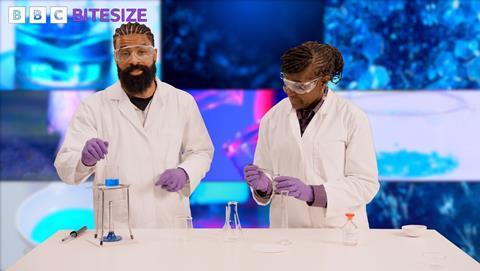Practical science videos enhance understanding and help students improve their experimental skills

Were you to ask any scientist about their early inspiration, they’ll mention practical science lessons. While there’s merit in memorising Avogadro’s constant or Boyle’s law, what really sparked my own passion was hands-on science – mixing, measuring, testing and seeing theory come to life. Now, as a science journalist, I know how vital those practical experiences were to understanding science and developing scientific skills: critical thinking, observation, accuracy, teamwork and communication.
There’s little difference between the scientific process taught in classrooms and what happens in professional labs. Whether you’re a student isolating a salt or a scientist purifying a drug, the core steps remain: form a hypothesis, design a method, measure carefully, record results and draw conclusions. In both settings, collaboration, curiosity and critical thinking are important.
Expectation versus reality
Although working with explosive materials or quantifying cancer cell compounds with chromatography has its own complexities, school practicals can be a lot harder. Time is tight, budgets are limited and the fact that students often only have one opportunity to complete each experiment is unthinkable in a field where repetition is the gold standard. If someone is absent or the practical doesn’t work as you expect, students can lose the opportunity to learn. It’s challenging because for students aged 14–16 studying GCSE science, the 18 to 24 required practicals (dependent on exam board and qualification) that they need to complete can all appear in their final exams. And 15% of total marks are dedicated to practical experiments.
Practical science is more than a curriculum requirement – it’s a vital way to build understanding
A valuable tool
Videos can support flexible learning and revision. Students can pause, rewatch or even narrate to strengthen recall. You can suggest students watch a relevant clip before a lesson to help those who benefit from seeing a process in action. Or learners can use videos afterwards, especially when real-life experiments go awry or results don’t match expectations. Video is an effective medium for practical science and the RSC’s own videos and supporting materials are a useful resource.
Videos can support flexible learning and revision. Students can pause, rewatch or even narrate to strengthen recall. You can suggest students watch a relevant clip before a lesson to help those who benefit from seeing a process in action. Or learners can use videos afterwards, especially when real-life experiments go awry or results don’t match expectations. Video is an effective medium for practical science and the RSC’s own videos and supporting materials are a useful resource (rsc.li/4lAV8P0).
Videos can’t replace practical experience – no one would suggest learning to drive by watching videos alone – but they can make a real difference to students’ understanding. A new series of BBC Bitesize videos of science practical investigations aims to complement science practicals in schools and provide a useful revision resource. Maggie Aderin-Pocock and I present the videos, which include core chemistry practicals such as titrating an acid and an alkali, making copper sulfate crystals and investigating endo- and exothermic reactions. What’s special is how closely the videos reflect real lab conditions and processes, while clearly supporting revision and understanding.
Videos can’t replace practical experience – no one would suggest learning to drive by watching videos alone – but they can make a real difference to students’ understanding. A new series of BBC Bitesize videos of science practical investigations aims to complement science practicals in schools and provide a useful revision resource (bit.ly/4070NnT). The videos are presented by Maggie Aderin-Pocock and me, and include core chemistry practicals such as titrating an acid and an alkali, making copper sulfate crystals and investigating endo- and exothermic reactions. What’s special is how closely the videos reflect real lab conditions and processes, while clearly supporting revision and understanding.
How videos enhance learning
Each video starts by framing the scientific idea and the goal of the experiment. We show the apparatus from a top-down view, clearly labelled so students can pause and familiarise themselves with what’s needed. There are close-up shots of methods, and a focus on demonstrating accuracy in measurement and data collection. We introduce scientific terminology throughout and clearly model the process of logging and interpreting results.
Importantly, the videos also model the collaborative nature of science. Throughout, Maggie and I discuss our observations, adjust our methods and reflect on the results – just as all scientists do. Understanding this process of discovery shows students that practical science isn’t about doing something right but developing skills in investigation and analysis.
I hope these videos give students the chance to connect classroom science with the real world and the professional lab. Practical science is more than a curriculum requirement – it’s a vital way to build understanding and scientific identity. With the right support, we can make sure students develop their experimental skills and begin to think and work like scientists themselves.
Alex Lathbridge is a biochemist-turned-science journalist and co-host of the BBC Bitesize science practicals











No comments yet